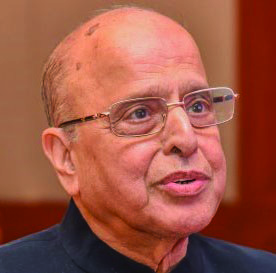This is an edited version of the address of Dr. K. Kasturirangan, Chairman of the committee which drafted NEP 2020 and currently Chairman, National Steering Committee for NCF, at the National Conference of School Education Ministers (June 2022)
NEP 2020 provides a clear roadmap for the transformation and reinvigoration of education in India, so that by 2040, India will have one of the best education systems worldwide
 We are in the midst of a historic period in Indian education. It is after 34 years that a new National Education Policy (NEP) 2020 has been formulated. In these years we have made some progress — without doubt. However, equity in and quality of education still remain a massive challenge. While we have established some world-class institutions, we still struggle to create similarly effective learning opportunities and environments for all our students.
We are in the midst of a historic period in Indian education. It is after 34 years that a new National Education Policy (NEP) 2020 has been formulated. In these years we have made some progress — without doubt. However, equity in and quality of education still remain a massive challenge. While we have established some world-class institutions, we still struggle to create similarly effective learning opportunities and environments for all our students.
In these 34 years, the social, political, and economic environment in India and the world has also changed significantly. The economy has opened up, social structures have changed, there is increased participation of all groups in political, social and economic processes and communication has grown exponentially. New global challenges such as climate change have emerged, while rapid changes in technology present both opportunities and challenges to human well-being.
At the same time there has been significant research and development in the fields of neurosciences, brain studies, and cognitive sciences. This has significant implications for school education. Therefore NEP 2020 is a transformative response to address all these matters, and prepare Indian youth and India for the 21st century.
NEP 2020 is also unique in terms of the extent and comprehensiveness of consultations involving stakeholders from the grassroots level upwards. These extensive consultations and their systematic incorporation have ensured that the federal nature of our Constitution is reflected in NEP 2020.
On June 24, 2017, the Committee for the Draft National Education Policy was constituted involving many of us. The new committee incorporated inputs from the previous consultations as well as the report of the Subramanian Committee (2016), while also extending consultations to seek inputs from 74 ministries and various bodies and 217 eminent persons, in addition to incorporating cutting edge research in education.
On May 31, 2019 the 484-page Draft National Education Policy (DNEP) was released. In continuation with the participative process, comments on DNEP 2019 were invited from all stakeholders. Overall, nearly 1.5 lakh suggestions and comments were received. These inputs were used to further fine tune DNEP 2019.
With DNEP 2019 as the basis, development of the final policy was carried out and the National Education Policy 2020 was released to the nation on July 29, 2020. NEP 2020, anchored in and based on the 484-page DNEP 2019, provides a clear roadmap and action-dimensions for the transformation and reinvigoration of education in India, so that by 2040, India will have one of the best education systems worldwide.
The Policy envisages some critical changes from the current system: (a) New school structure in four stages — 5+3+3+4 (from the current 10+2) — aligned to the cognitive and socio-emotional development of children based on neuroscience research. (b) Integrative and holistic curriculum with equal emphasis on science, social sciences, visual and performing arts, languages, sports, mathematics. (c) No hard separation or hierarchy of subjects; integration of vocational and academic streams; and (d) Emphasis on key concepts, experiential learning, analysis and reflection, values, and life skills.
Hon’ble Minister of Education Dharmendra Pradhan is leading a truly rigorous and inclusive effort for comprehensive implementation of NEP 2020 in school education and higher education.
The first critical step in the implementation of NEP 2020 for school education is the development of the National Curriculum Frameworks (NCFs) for school education, teacher education and adult education. Under the leadership of Shri Pradhan, the ministry of education and NCERT have already laid the foundations through initiating the necessary fundamental groundwork.
The ministry has constituted a National Steering Committee to guide the process of development of the NCFs, on one side to ensure the integrative and holistic nature of curriculum as envisaged by NEP and on the other to ensure seamless working with the ministry and NCERT. To this end, the National Steering Committee assisted by the Mandate Group has developed a mandate document to detail the NCF development process, output, timelines and anchoring to NEP 2020, and to provide detailed guidelines for all stakeholders involved in the process.
Under NEP 2020, there will be four curricular frameworks: for ECCE, school education, teacher education, and adult education. The ECCE and School Education frameworks will be seamless and integrated, as they must be to bring to life the vision of the NEP for the Foundational Stage in the 5+3+3+4 system. The teacher education framework will be deeply informed by the ECCE and School Education frameworks. The Mandate Document guides the process of development, anchors the whole effort clearly in NEP 2020, and lays out the vision for the NCF. My request to all of you would be to read the Mandate Document, because it is the bridge between the NEP and the NCFs.
States have an important role in the development of NCFs. The NCF will draw heavily from all the 25 Position Papers developed by each state, the district level consultations and mobile app surveys that have happened and are happening across the country. District level consultations and the survey have included teachers, parents, teacher educators, community members, experts, students (school and higher education), anganwadi workers, school principals, neo literates, etc. 25 National-level Focus Groups are also providing inputs into the NCF development process. Both State and National Focus Groups have conducted widespread consultations. These consultations will continue as the NCF development process moves ahead.
The NCFs will reflect the key transformations proposed by NEP 2020 and become the basis for teaching and learning in our schools.
(a) Once the draft NCF is developed, it will go back to the states for review. The NCF will be finalised after feedback is received from all states.
(b) Based on the NCF, each state will develop its own State Curricular Framework (SCF). The SCF will be the basis for the syllabus, textbooks and learning material in schools along with the approach to in-service teacher education in the State.
(c) All this will together drive improvement in classroom teaching and student learning outcomes.
The first critical step in the implementation of NEP 2020 for school education is the development of the National Curriculum Frameworks (NCFs) for school, teacher and adult education
NEP 2020 says the purpose of the education system is to develop good human beings capable of rational thought and action, possessing compassion and empathy, courage and resilience, scientific temper and creative imagination, with sound ethical moorings and values and a rootedness in India.
Two critical areas of focus in NEP 2020 are strong emphasis on high quality early childhood care and education for all children and the achievement of foundational literacy and numeracy by all children by Grade 3.
(a) The Foundational Stage of the 5+3+3+4 design comprises five years between the ages of 3-8 years which includes time spent by the child in anganwadis and schools.
(b) While different departments may handle different parts of the Foundational Stage, States must ensure that the Department of Women and Child Welfare and the Department of Education work closely together.
(c) NIPUN Bharat is now a flagship program of the Union Ministry of Education. States must take advantage of this and implement it with full rigour to achieve the objective of all children having attained foundational literacy and numeracy by Grade 3 by 2025.
NEP 2020 sees teachers as central to good education.
(a) Once the NCF for School Education is complete, the NCF for Teacher Education (NCFTE) will be developed. It will be the basis on which both pre-service and in-service teacher education should be designed in the country.
(b) Going forward, the four-year Integrated Teacher Education Program (ITEP) will be the standard qualification for teachers. States must encourage the best universities and colleges to offer the ITEP so that high quality teachers can enter the system very soon.
(c) If good in-service teacher education has to be ensured, academic support institutions like State Councils for Educational Research and Training (SCERT), District Institutes of Education and Training (DIETs), Block Resource Centres (BRCs) and Cluster Resource Centres (CRCs) must be significantly strengthened. Currently, most of them struggle with inadequate infrastructure, learning resources and faculty. States must focus on building these into high quality institutions so that teachers and schools are well supported to make the kind of transitions that NEP 2020 envisages.
NEP 2020 describes a good education institution as one in which every student feels welcomed and cared for, where a safe and stimulating learning environment exists, where a wide range of learning experiences are offered, and where good physical infrastructure and appropriate resources conducive to learning are available to all students. The fundamental principle that guides good education is that all children are capable of learning. NEP 2020 sees equity and inclusion as a cornerstone of our education system.
Children with disability must be particularly addressed in this regard. States must ensure that every Block Resource Centre has inclusive education specialists, in-service teacher education must include modules on understanding this area and learning to respond to it. Early identification of disability is critical. Again, the Education and Women and Child Welfare ministries in every State must work together on ensuring that this is done in all anganwadis, early childhood care centres and early grades in school.
Another critical part of the NEP 2020 which will be reflected in the NCF is the importance of the mother tongue. Research from across the world tells us that children learn best in their language of comfort. Research also tells us that children are capable of learning more than one language and that multilingualism is important for cognitive development. It is critical to learn languages well. This is the route to learning other subjects well. NEP 2020 emphasises the rich diversity of languages in our country. We must see this as an invaluable asset in education.
The success of the policy will lie in the successful implementation of the NCFs that truly reflect the spirit and specifics of the NEP 2020. The transformation of school education is contingent on this aspect. In turn, implementation of the NCFs largely depends on all of you present in this meeting. It is your vision and leadership that will drive the changes necessary to enable this.
A strong, vibrant public education system is the foundation of democracy. Our public education system must be of the highest quality and complete equity. Implementing NEP 2020 is an opportunity to make this transformation happen. States and the Centre must work closely together towards this. This is the synergy that will make this transformation a reality.
Also read: NEP 2020 flexible, not imposed on states: Sitharaman



























